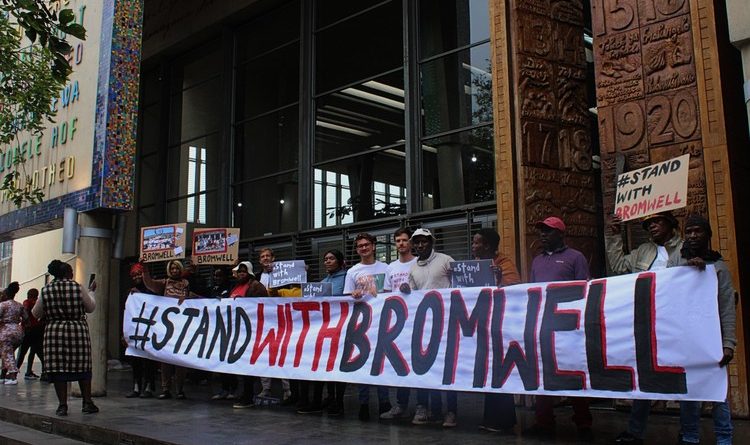Bromwell Street Residents Achieve Major Victory in Constitutional Court Battle Against Eviction
On Friday, residents of Bromwell Street in Woodstock, who have fought against eviction for eight years, rejoiced after a significant court ruling.
The Constitutional Court (ConCourt) has prohibited their eviction until the City of Cape Town establishes a new housing strategy that includes transitional housing.
ADVERTISEMENT
CONTINUE READING BELOW
Read: Cape Town’s new plan for inner-city housing
Currently, the city’s program does not address the need for temporary emergency accommodation in the inner city and overlooks the situations of those facing eviction, particularly those who have resisted forced removals under various Group Areas Acts for years.
A property development firm purchased the six adjacent Bromwell Street cottages for R3.15 million in 2013. While the city proposed alternative housing for residents, these options were located far from the city center, where residents work and children attend school.

Capetonian Charnell Commando expresses her relief upon learning of the Constitutional Court’s ruling in favor of Bromwell Street residents. Image: Matthew Hirsch, GroundUp
In 2021, Western Cape High Court Judge Mark Sher ruled the city’s emergency housing program unconstitutional and mandated the city to provide housing for the residents in Woodstock, Salt River, or the inner city, as close as possible to Bromwell Street.
However, this decision was later overturned by the Supreme Court of Appeal (SCA), which stated that Judge Sher’s ruling could not prevail as it did not clearly identify the invalid aspects of the program that the city needed to amend.
The court also clarified that it could not dictate the city’s financial allocations for housing programs.
Nonetheless, the SCA recognized that it would be “just and equitable” for the residents to receive temporary emergency accommodation “in a location as near as possible to where they reside” and emphasized the importance of treating them with dignity and concern.
Read:
Cape Town extends public comment on sale of old Woodstock Hospital
City of Cape Town starts moving people from CBD streets following court judgment
Cape Town gives green light to new Woodstock social housing project
The residents, with support from the Ndifuna Ukwazi law center, escalated their case to the highest court.
Justice Rammaka Mathapo, representing the majority opinion, noted that the implementation of the emergency housing program took place against the backdrop of gentrification in areas like Woodstock and Salt River, a process encouraged by the city with the aid of tax incentives.
“The pivotal question is whether a municipality’s constitutional obligation to provide temporary emergency housing is extended to offering it at a specific location… and whether the city acted reasonably in determining the location of the emergency housing provided, which was approximately 15 kilometers away and, critically, situated outside the inner city and its surroundings,” Justice Mathapo stated.
He pointed out that the residents argued in the apex court that the SCA addressed the wrong issue – the pertinent question being whether the city acted reasonably by completely excluding temporary emergency housing, rather than just social housing, from the inner city.
They contended that the court had misinterpreted the harmful consequences of gentrification, which has led to the forced removal and displacement of residents to informal settlements far from the city center, severely impacting their dignity and entrenching spatial apartheid.
Inconsistencies
The residents argued that the high court’s declaration of invalidity was limited and that the SCA failed to specify which elements were inconsistent.
In contrast, the city maintained that the appeal should not proceed.
The City of Cape Town claimed its housing program was reasonable and that if it were compelled to seek additional locations within the city, it would have to divert resources from social housing programs better suited to the inner city.
Justice Mathapo affirmed the court’s authority to address the matter because it involved constitutional rights regarding dignity, freedom, security, and privacy.
The determination of the issue was significant for the public and in the public interest.
Judicial concern
“Currently, the law does not grant evictees the right to emergency housing in a specified location. However, over the years, the jurisprudence regarding access to adequate housing has evolved, making the alleviation of poverty a legitimate judicial concern,” he noted.
“When evaluating whether a set of measures is reasonable, they should be examined within their social, economic, and historical context. A housing program must be comprehensive, consider all societal groups, and remain adaptable to effectively address housing crises along with short, medium, and long-term needs.”
He emphasized that the needs of the most vulnerable populations must be prioritized, and the locality of temporary emergency housing is “paramount.”
ADVERTISEMENT:
CONTINUE READING BELOW
Although limited state resources are a factor, Justice Mathapo stated that the city’s broader “spatial transformation project seems to be a misguided endeavor rooted in the maintenance of spatial segregation and infamous influx control, attempting to inexplicably ‘preserve’ the inner city while marginalizing impoverished individuals.”
‘Untenable’
“The gentrification strategy aims to achieve what the apartheid-era forced removal policy failed to accomplish, essentially dismantling one of the few communities that managed to resist displacement from ‘white’ Cape Town during apartheid,” he described as “untenable.”
“Emergency housing plays a vital role in preventing homelessness and alleviating immediate crises. The city’s failure to allocate sufficient resources to this area undermines the right to adequate housing for vulnerable communities.”
Justice Mathapo asserted that the city possessed adequate resources but was allocating them to develop social housing, which, while important, should not infringe upon the human rights of others.
Listen/read: Sell your city: Cape Town Mayor Geordin Hill-Lewis
He noted that the Bromwell residents were not unlawful settlers; rather, they were legal rent-paying tenants who are now expected to relocate 15 kilometers away from the city, disregarding the practical challenges this entails, such as severing their community and social networks and losing access to essential services.
Reminiscent of District Six
Displacing vulnerable individuals from the city is a regressive action, particularly in light of South Africa’s past, and is “reminiscent of the destruction experienced in the nearby District Six.”
“The city was aware that most of the residents would not qualify for social housing or receive such housing, yet it proceeded to ignore their needs and circumstances. It is inappropriate to prioritize social housing while completely neglecting the issue of emergency housing in the inner city.”
“The city appears to prioritize the gentrification agenda over the principles of spatial justice, overlooking the evictions and displacements of residents who have lived in their homes for generations and survived forced removals during apartheid. It is unconscionable that in this new democracy, residents must now face the humiliation of displacement reminiscent of apartheid when they have fought valiantly to keep their homes,” Justice Mathapo explained.
He declared the city’s implementation of its program unconstitutional, outlining the reasons and directing the city to formulate a reasonable temporary emergency accommodation policy in alignment with these findings.
Justice Mathapo ordered the city to provide the residents with temporary emergency accommodation in the inner city as close to Bromwell Street as possible, stated that they cannot be evicted until that provision is made, and mandated the city to cover the costs of the application.
In a dissenting opinion, Justices David Bilchitz and Alan Dodson expressed agreement with the majority ruling but would have additionally mandated the city to engage in meaningful discussions with the residents about potential locations within a four-month timeframe, ensuring they are treated with dignity in this process.
They also suggested a “supervisory order” requiring the City of Cape Town to report back to the court on its progress.
© 2024 GroundUp. This article was published here.
Listen/read: Housing finance friction
You can also listen to this podcast on iono.fm here.
Stay updated with Moneyweb’s comprehensive finance and business news on WhatsApp here.




